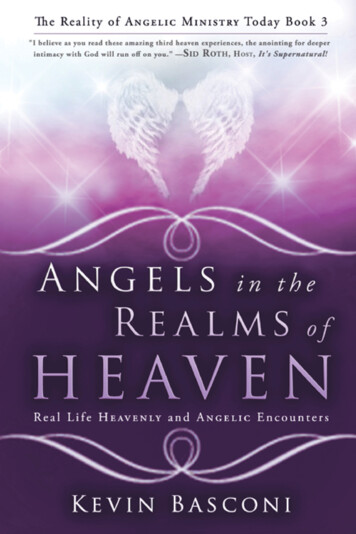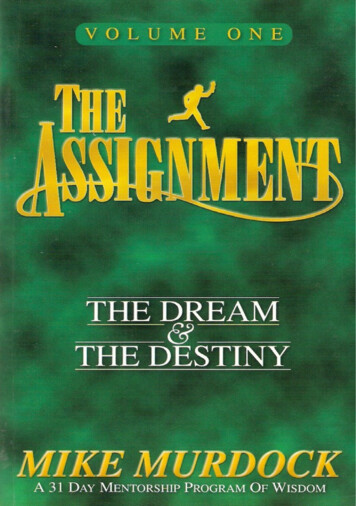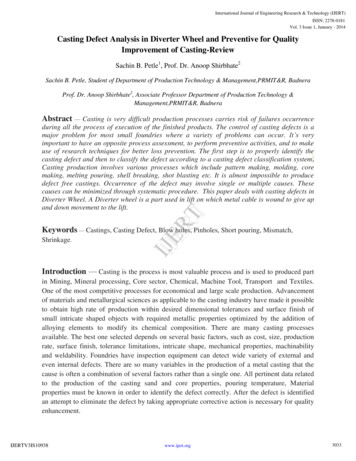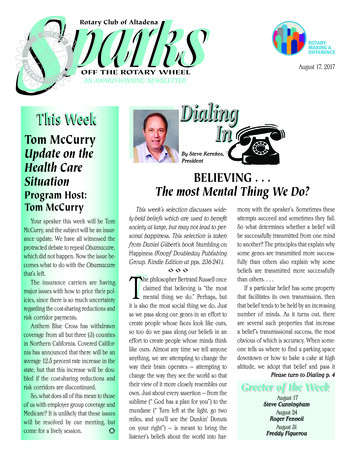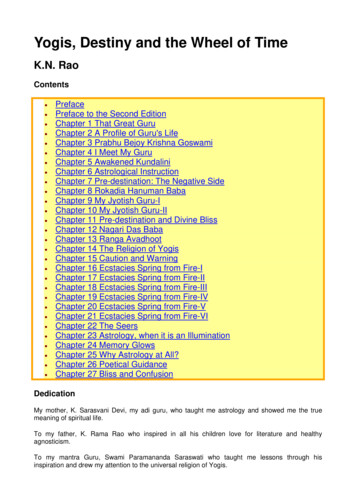
Transcription
Yogis, Destiny and the Wheel of TimeK.N. RaoContents PrefacePreface to the Second EditionChapter 1 That Great GuruChapter 2 A Profile of Guru's LifeChapter 3 Prabhu Bejoy Krishna GoswamiChapter 4 I Meet My GuruChapter 5 Awakened KundaliniChapter 6 Astrological InstructionChapter 7 Pre-destination: The Negative SideChapter 8 Rokadia Hanuman BabaChapter 9 My Jyotish Guru-IChapter 10 My Jyotish Guru-IIChapter 11 Pre-destination and Divine BlissChapter 12 Nagari Das BabaChapter 13 Ranga AvadhootChapter 14 The Religion of YogisChapter 15 Caution and WarningChapter 16 Ecstacies Spring from Fire-IChapter 17 Ecstacies Spring from Fire-IIChapter 18 Ecstacies Spring from Fire-IIIChapter 19 Ecstacies Spring from Fire-IVChapter 20 Ecstacies Spring from Fire-VChapter 21 Ecstacies Spring from Fire-VIChapter 22 The SeersChapter 23 Astrology, when it is an IlluminationChapter 24 Memory GlowsChapter 25 Why Astrology at All?Chapter 26 Poetical GuidanceChapter 27 Bliss and ConfusionDedicationMy mother, K. Sarasvani Devi, my adi guru, who taught me astrology and showed me the truemeaning of spiritual life.To my father, K. Rama Rao who inspired in all his children love for literature and healthyagnosticism.To my mantra Guru, Swami Paramananda Saraswati who taught me lessons through hisinspiration and drew my attention to the universal religion of Yogis.
To my Jyotish Guru, Yogi Bhaskaranandji, who convinced me that astrology was not fortunetelling, but that it peeps into the divinity of life.To Swami Moorkhanandji, who talked me out of my decision to give up astrology and argued that Ishould concentrate on the academic beauty of this subject.To Mouni Baba of Ujjain, who asked me to predict less and write more.To my brothers, sisters and their families, who witnessed some of the incidents mentioned in thebook and helped me put them into proper sequence.Acknowledgements I must thank my younger brothers, K.Vikram Rao and his wife, Dr. Mrs. K Sudha Rao; and K.Subhas Rao and his wife K. Vijaylakshmi for reading the manuscript from beginning to end andoffering very constructive suggestions. Shri Rajeev Jhanji, who gave me his computer to produce the remaining part of the book so fastand gave me telephonic instructions when I had some difficulties with the computer. Shri Vinay Aditya, whose excellence of English has always helped me rewrite some sentences. Ms. Heide Fiechter of Switzerland, who spent a week in February 1995 on my manuscript. AlsoMs. Monika Mcclain of Seattle, a Vedic astrologer of USA with experience of editing booksprofessionally, edited the manuscript.Both Monica and Heide said that a book about yogis, no longer living, inspired them, but myexperiences with living Yogis was the proof of my truthfulness and fire of spiritual conviction. To Leona Reugg for helping me revise the second edition. All those readers of the Astrological Magazine, in which some of the pieces were serialised, bywriting to me and telling me that these have been the best ever articles to have appeared in themagazine. They are in the hundreds and I thank them all. My students of astrology who read the articles and tested the astrological principles given hereand there, showing the promise of spirituality in a horoscope.About The AuthorRao has seen ordinary looking men and women evolve spiritually and has met great yogis, manyof them still living. He writes about them, and talks about them.But he is famous as an astrologer.He learnt astrology from his mother and the art of writing, from his father, K. Rama Rao, who was afamous Indian journalist in English language between 1930 and 1960. Rao's mantra Guru was aBengali from eastern India. His Jyotish Guru was a Gujarati from western India. Himself, a southIndian, brought up in northern India, he is an Indian in the truest sense of the term with noparochialism, casteism, regionalism or the other types of narrowness usually associated withpeople all over the world. It is why he does not confine his account of spiritual experiences to onenarrow region of India. His book on Devaraha Hans Baba, is a critical recording of the miracles hehad witnessed for thirty six days continuously in 1994. He has the courage of conviction to writeabout living yogis with as much enthusiasm, as about those, who are no more with us. He narratespart of his long spiritual quest, which makes him say repeatedly in conversations that a life without
spirituality is an animal life only. It is on the insistence of his friends that Rao decided to write outonly a few of his own personal experiences about the undying spiritual heritage of India, here inthis book. It is a first-hand account all through.In his book, Astrology, Destiny and the Wheel of Time which has by now been acclaimed as thebest book to have come on Vedic astrology in English, the author has given enough hints abouthow lucky he had been from the childhood, when he saw from closest quarters great saints andyogis like Ma Anandmoyee, whom he served as a boy in sub-teens; how the great Neem KaroliBaba was a regular visitor to Nazarbagh, Lucknow, where he was brought up. Rao has done moreoriginal and fundamental researches in Vedic astrology in the last two decades and publishedthem, than any other living contemporary of his. He is neither a translator of the classics of Vedicastrology nor a mere compiler, as most of the other writers, tend to be.It is not unusual for an Indian to meet great yogis and fakirs almost all his life. India is a land ofspiritual giants. K.N. Rao has been luckier than most Indians in this respect, as his great GuruSwami Paramanand Saraswati had told him, one year after his initiation, on April 24, 1962, thatwhere ever he went he would meet great yogis. He is one of the few who can give absolutely firsthand account of what he saw, when, alone in the company of those yogis and, also describe hisown spiritual experiences. Yet, as instructed by his Guru, he has restrained from narrating his ownexperiences and, has confined himself, mostly to others'. A great Guru forbids his disciple todiscuss his own great spiritual experiences.This book is different from any other book on spiritual phenomena in many ways: there is thesplendour, grace, kindness and extraordinary powers of the yogi; there is that inscrutableharshness of the yogi, behind which remains the concealed story of his kindness, which thedevotee may either not realise or, realise when it is too late. A yogi once beat a very poor man witha baton, till he bled. Few days after, he prospered. The yogi had destroyed all his misfortunes.Such inscrutable acts of yogis are well understood by Indian villagers, while the urbanite judges theyogi with his own hypocritical parameters. It is not unusual in Indian families to talk of yogis amongancestors. In the case of K.N. Rao, both from his paternal and maternal side there have been yogiswho gave up everything material and lived on madhukari (the rule imposed on a celibate disciplethat he would get alms from one house only each day for certain number of years, and if refused inthe very first house, he would have to remain hungry the whole day). One of Rao's uncles is agreat yogi in Chitrakoot, in the state of Uttar Pradesh, while the other is in Kalahasti, in the state ofAndhra Pradesh. The famous Jillallmudi Ma of Guntur of Andhra, who had thousands of followersand died recently was the cousin of Rao and she herself had told him that after fulfilling hisastrological mission he too would have to take to a life of complete renunciation.Rao who learnt astrology with his mother, K. Sarasvani Devi, was inspired more by his Yogi Guru,Bhaskaranandaji, to look into the spiritual depths of a horoscope first. He taught him certainsecrets which he has been asked not to reveal much, except referring to them here and there. It iswhat Rao has done in this book.During his under-graduate and post-graduate days, Rao had come under an intense spell of Marxand Freud. He accepted the socialism of Acharya Narendra Dev, whom he even now regards asthe greatest agnostic guru, he has met in his life. It took him away for some years from thechildhood experiences with yogis and, from the spiritual tradition of his mother. He spent his daysquestioning spiritual phenomena. But God was kind to him. Between 1959 and 1961 when he wasat Allahabad, he had such rare spiritual experiences that he found it difficult to accept Freud orMarx, as anything other than geniuses, who had only a partial, distorted and fragmented view ofthe baser side of human life. From there, it had been for him long and agonising retracing of histraditional spiritual roots.He spent some time in Sevagram, at Wardha with Mahatma Gandhi and, felt that the Mahatmawas a truly spiritual person but, with a clearly defined political mission. It is why he does not includeMahatma Gandhi in his list of yogis or mahatmas here.
Rao's transformation began when he was transferred to Shillong in January 1962, where he methis mantra Guru, Swami Paramanand Saraswati, who not merely spiritualised his life but alsorekindled his interest in astrology. The book revolves round the pivotal figure of his great Guru but,deals with so many more great Yogis, some of them living.These days Rao has been teaching astrology, privately also, to a friend's daughter. He hasadvised her to keep in reserve her spiritual power and predict, first through astrology,systematically, then seek final clarity through her inborn psychic powers. This young woman givesamazing predictions. But when she asked Rao to become her guru, his answer was that one couldbecome a guru only if one realised God, which had not happened to him. He did not haveinstructions from his Guru to initiate anyone. His clear and firm opinion is that those who becomegurus without such clear divine instructions, were fake gurus who did a lot of damage to honestspiritual tradition of India. Since 1980, Rao has been refusing to take this tempting offer ofbecoming a guru who could be promoted well in the west.1Rao who has been a very high ranking officer of the Government of India, retired as DirectorGeneral, in 1990. He has had the rare opportunity of interacting with the most westernised Indians,without any spiritual roots in the traditions of India2 and also, interacting very intimately with mostseekers.3 It is why he has had a lot of bitter and sweet experiences and exchanges with a varietyof persons. In this book he writes, as is his habit, with candidness and sometimes bitingly, aboutsome incidents which a person who has taken to spiritual life, has to face.Whether it has done him good or not is, for others to decide. Yet the agnostic in him makes himreject the claims of yogis unless he witnesses them first hand. In the same vein, he insists that anastrologer should produce original research and not become a mere compiler or translator. Itexplains why he has so many enemies in the world of astrologers. His argument that an astrologerwho does not have a horoscope, with favourable dasha and yogas for distinction in astrology inIndia or abroad, should not be envious of others, who get such fame. To be envious is to disbelievein astrology, itself. Naturally the envy of other astrologers showed their own lack of knowledge ofastrology though some of them, as editors of some astrological journals, felt that they were entitledto greater honour and fame, inspite of their horoscopes which showed more money only.When it comes to a fake yogi, he expresses no opinion but withdraws quietly and does not meethim again, ever.He emphasises that a true yogi gives you inner experiences, without your having to ask for it. Butwait patiently and with true spirit of humility. The great yogi walks into your house, unannounced, iswhat he and his truly spiritual friends have experienced. Rao has seen the seamy and brightersides of life in ashrams, because he has had to run his Guru's ashram twice, in two spells, in fiveyears. The bliss that it was, the agony that it was, the vistas of divinity it opened out before him andthe depths of human villainy that it has shown to him, has made him almost apathetic to the veryidea of building up big ashrams.1. An American regretted that he was not brown in complexion to get himselfaccepted as a guru in the USA. He asked Rao if he should promote him as aguru in the USA, where it can be a good multi-dollar business.2. As the Director of International Courses in Revenue Audit, thrice, he hadmet them.3. Mainly because of the ISKCON and Mahesh Yogi's great work in the USA.The most unusual topic in this book is that anytime, anywhere, anyone in India can hope to meet agreat yogi, if such a spiritual quest is genuine. It is only the materialistic, the hypocritical, the
agnostic, the atheistic and the close minded persons that would fail to recognize a great yogi. Raonever claims to be a yogi, though some American friends, who have seen how he lives in India,have done so.Rao and the members of his brothers' and sisters' families have been lucky in this regard. Some ofthe finest yogis come into their lives, visit their homes without any previous notice or appointment.They are, atithi in the truest sense of the term. Atithi means one who comes without any previousintimation, about his arrival because the tithi (the lunar day) of his arrival is unannounced. 'A' is anegative prefix. Thus an atithi is not a guest, as used in English.The purpose of this book is to tell readers that as in any field the sublime co-exists with dross. Theover-publicised, the advertised yogi may be a fake or in elementary stages of spiritualdevelopment, while the great one appears suddenly and vanishes suddenly, after guiding thespiritually deserving aspirant.The message of the book is: keep alive pure faith, have no material desires, wait and watch thegreat yogi who performs miracles through the great inner transformation he brings out in you. Raobegan this serious quest wh
He learnt astrology from his mother and the art of writing, from his father, K. Rama Rao, who was a famous Indian journalist in English language between 1930 and 1960. Rao's mantra Guru was a Bengali from eastern India. His Jyotish Guru was a Gujarati from western India. Himself, a south Indian, brought up in northern India, he is an Indian in the truest sense of the term with no parochialism .

